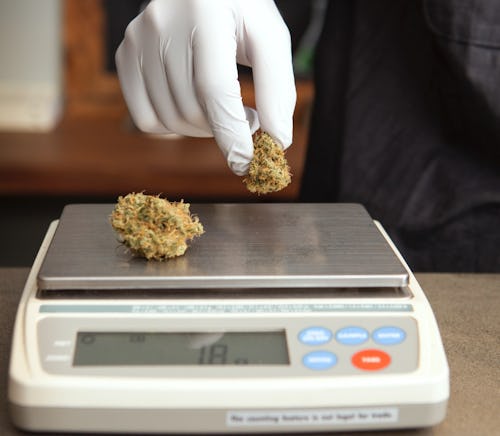New Yorkers with weed convictions will be first to receive retail licenses
It’s a modest but notable attempt at social equity in a profoundly white industry.

As weed becomes legal in more and more states, everyone from Justin Bieber to Gwyneth Paltrow has tried to sell me some dope. Many of us can’t help but feel a profound sense of injustice at these rich, white celebrities profiting off an industry that thousands of Black and brown people have been imprisoned for. Thankfully, New York is about to take a small but impressive step to correct some historic wrongs: The state will give its first batch of weed retail licenses to people who were convicted for cannabis offenses and their family members, according to the New York Times.
New York Governor Kathy Hochul’s proposed plan, which is likely to be passed, will invest $200 million in helping weed retailers secure storefronts, per the Times. The plan hopes to offset a trend in so many other states where weed has been legalized but business owners from historically marginalized communities have not had the capital or resources to open successful dispensaries. On top of that, New York’s Office of Cannabis Management announced that they plan to grant half of the state’s cannabis licenses to minority and women-owned companies, struggling farmers, ex-cons and disabled military veterans, per Rolling Stone.
Now, we can all celebrate this as a huge win while still acknowledging that it’s a modest step and won’t nearly cancel out the devastation wrought on Black and brown families by the war on drugs. The state’s Office of Cannabis Management estimated that between 100 and 200 licenses will go to people who were convicted of weed-related offenses, per the Times, which is a tiny drop in the prison-industrial complex clusterfuck of an ocean. Between 2001 and 2010, there were 8.2 million weed-related arrests and 88% of those were simply for possession, according to the ACLU. On top of that, New York State has one of the highest number of prisoners in the country. Many of those people and their families will continue to live with the consequences of cannabis criminalization.
We’re cautiously optimistic here and hope that this action will actually help launch Black-owned dispensaries but the reality is that this is an expensive endeavor that’s been rooted in wealth disparities from the beginning. Still, New York’s efforts serve as an example of what’s possible when governments actually work towards making amends, even if some of those are symbolic. At the very least, I see an attempt not to repeat the wrongs of the past and to acknowledge that that past exists in the first place, which is more than most of the rest of the country can say.